

SUBSCRIBE TO OUR FREE NEWSLETTER
Daily news & progressive opinion—funded by the people, not the corporations—delivered straight to your inbox.
5
#000000
#FFFFFF
To donate by check, phone, or other method, see our More Ways to Give page.


Daily news & progressive opinion—funded by the people, not the corporations—delivered straight to your inbox.
"This is a war on working people—and we will not stand down."
With right-wing, pro-corporate political parties across the world aggressively pushing anti-immigration policies and sentiment as they worsen inequality and attack crucial services, working people across the world gathered on Thursday to mark May Day—the holiday memorializing the struggles and victories of the global labor movement—and to let those in power know they aren't fooled by xenophobic scapegoating.
"They tell people that migrants are to blame for failing hospitals, job insecurity, and rising rents," said Esther Lynch, general secretary of the European Trade Union Conference in Paris. "This is a lie—a dangerous lie. The true cause is austerity, it is underfunding, privatization, and a refusal to invest in people. It's price gauging, it's union busting, it's pay injustice."
Here are photos from demonstrations and marches worldwide:
Protesters with red flags raise their fists as they march during a May Day (Labour Day) rally, marking International Workers' Day, outside the Greek Parliament in Athens, on May 1, 2025. (Photo: Angelos Tzortzinis/AFP via Getty Images)


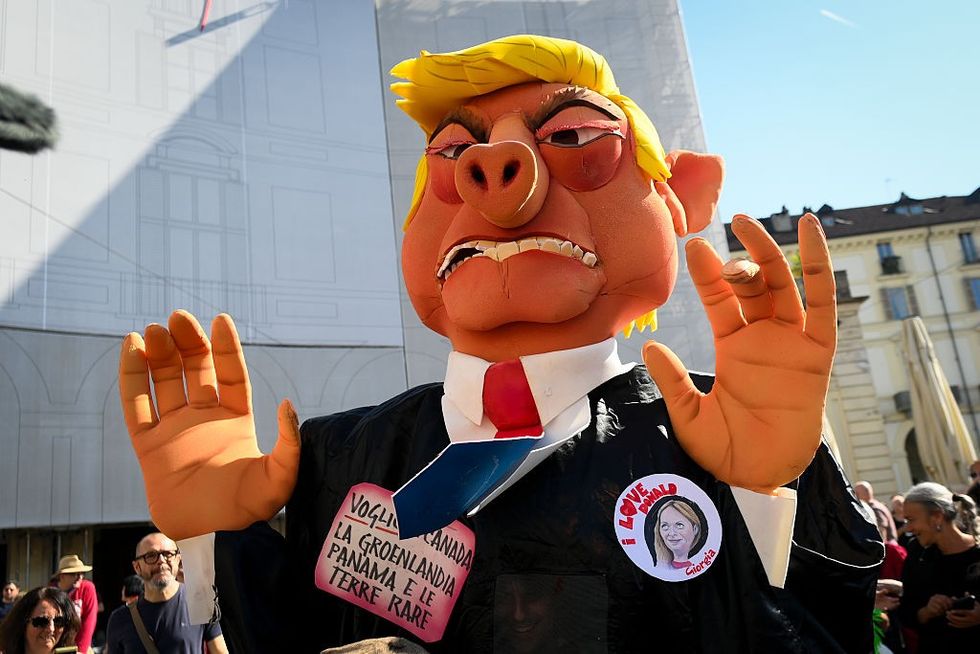
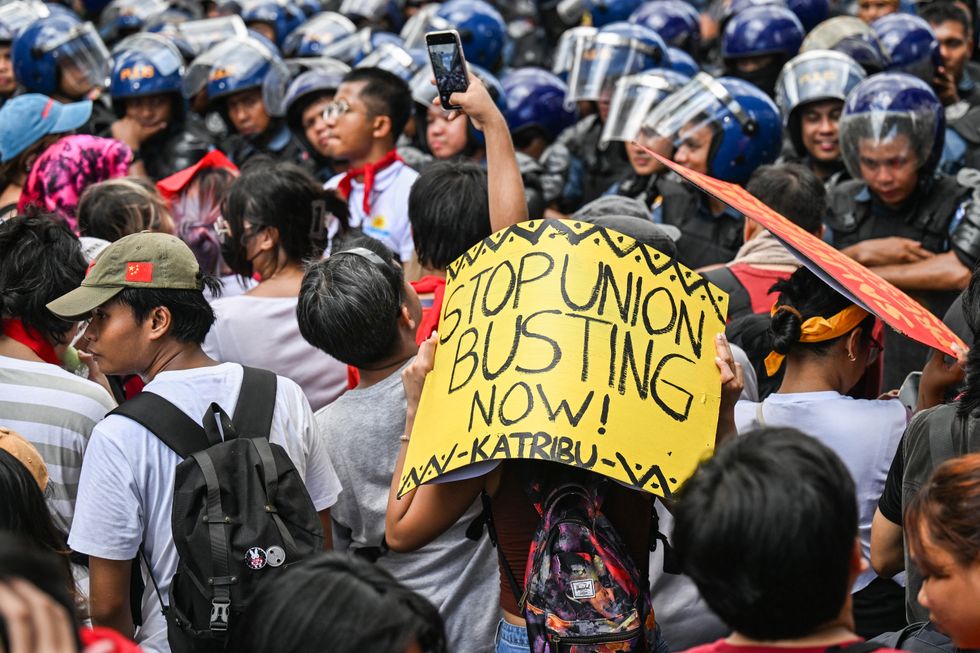
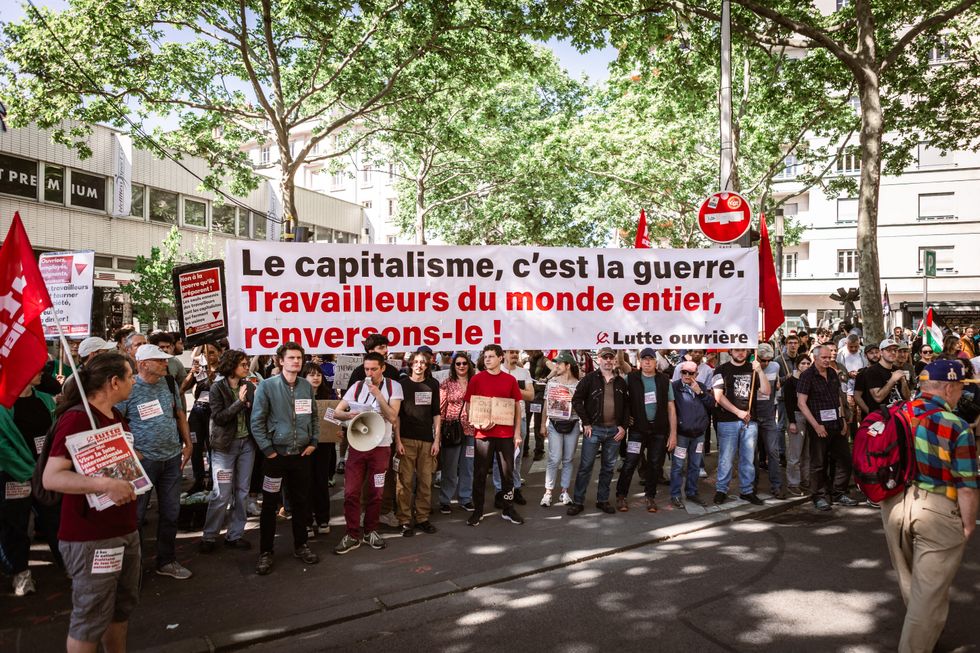

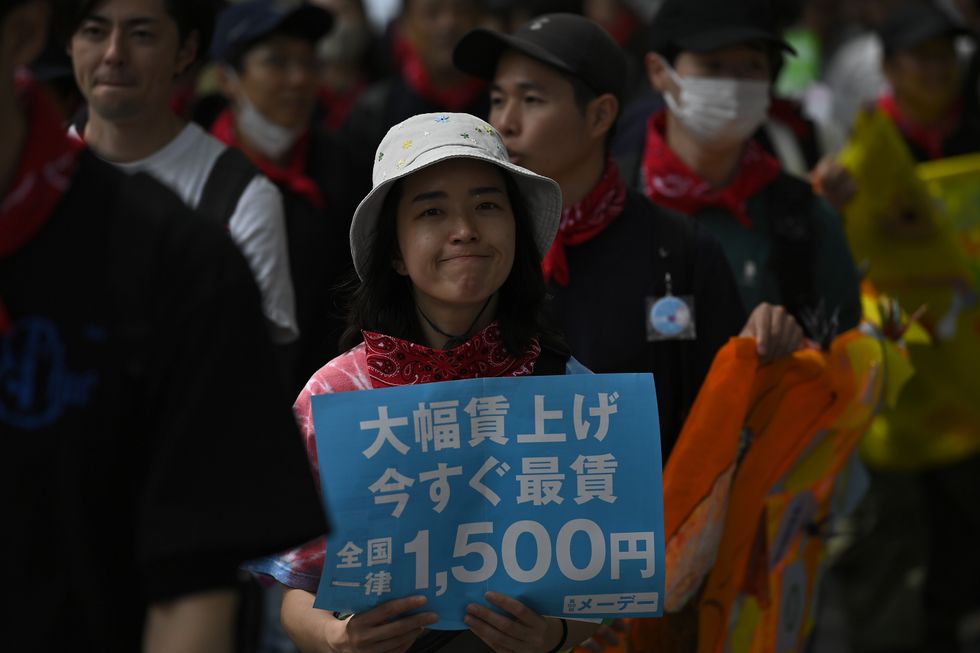
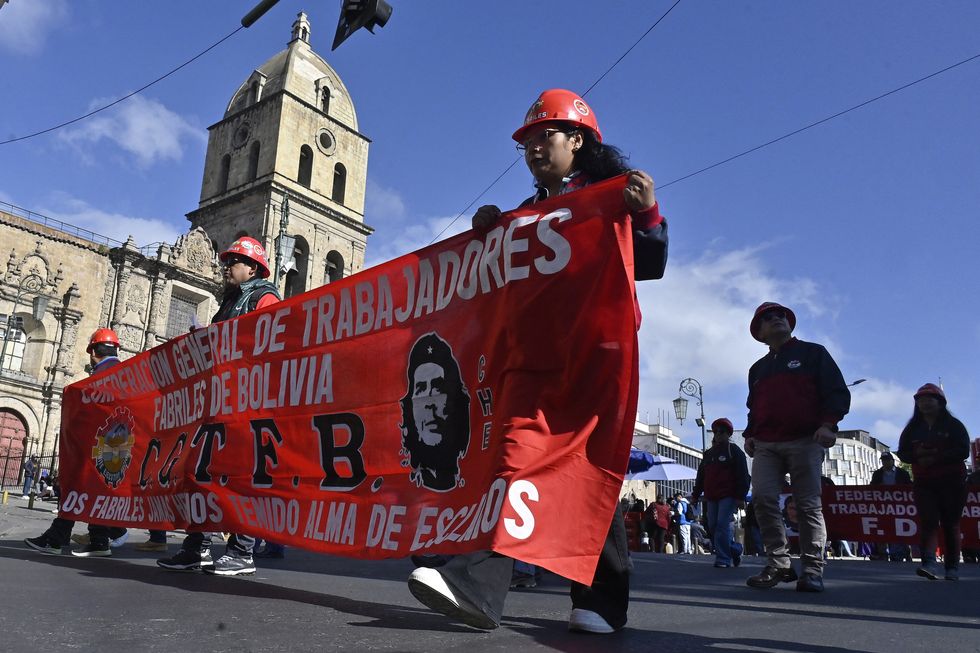
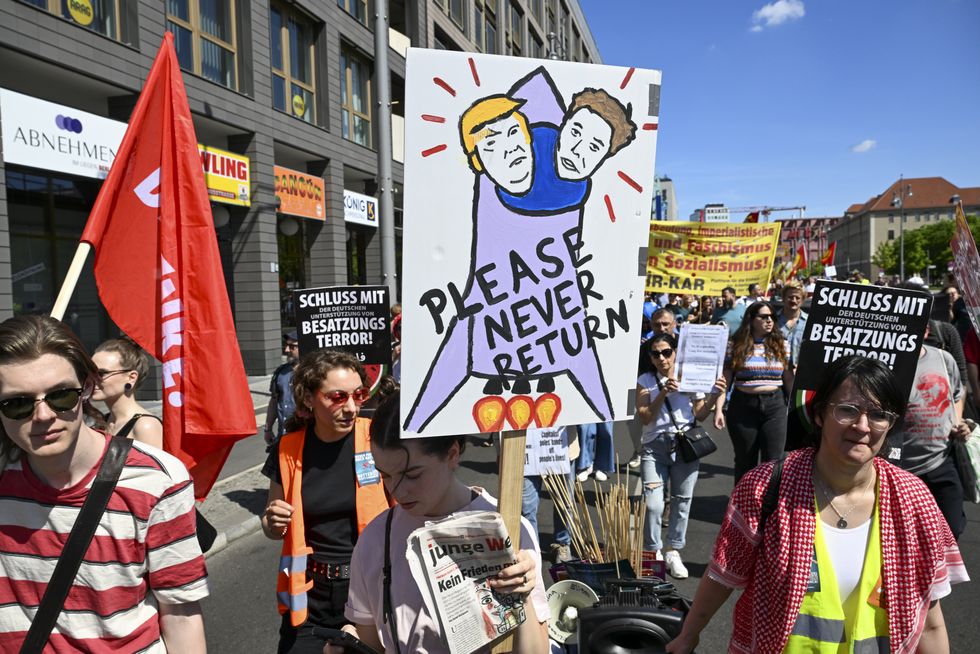

Paris was the site of France's main May Day rally, but an estimated 260 protests kicked off throughout the country, hosted by the General Confederation of France (CGT).
In the United States, protests were expected in nearly 1,000 cities, with many participants tying the fight against union-busting, the high cost of living, privatization, and corporate greed to President Donald Trump's administration—which has spent the past three months working to secure $4.5 trillion in tax cuts for the wealthy while pushing a mass deportation campaign and blaming working families' struggles on a so-called "invasion" by immigrants.
"This is a war on working people—and we will not stand down," a website for the U.S. May Day protests reads. "They're defunding our schools, privatizing public services, attacking unions, and targeting immigrant families with fear and violence. Working people built this nation and we know how to take care of each other. We won't back down—we will never stop fighting for our families and the rights and freedoms that propel opportunity and a better life for all Americans. Their time is up."
French union leaders also used the occasion to decry the "Trumpization" of global politics, and Italian protesters in Turin paraded a puppet of the U.S. president.
The global movement sent the message that "there is an alternative to the billionaire vision of the world," said the International Trade Union Confederation (ITUC).
Other May Day marches and rallies were held in countries including Germany, the United Kingdom, Spain, Greece, the Philippines, Turkey, and Japan.
"Around the world, workers are being denied the basics of life like well-funded hospitals and schools, living wages, and freedom to move, while billionaires pocket record profits and unimaginable power," said Luc Triangle, general secretary of the ITUC. "A system built for the 0.0001% is rigged against the rest of us—but workers around the world are standing up and organizing to take back democracy."
"Workers are demanding a New Social Contract that works for them—not the billionaires undermining democracy," said Triangle. "Fair taxation, strong public services, living wages, and a just transition are not radical demands—they are the foundation of a just society."
On May 8, the ITUC plans to issue an open letter to heads of state and global institutions demanding a new social contract, including collective bargaining rights for all workers; minimum living wages; and governments that ensure universal healthcare, education, and other public services.
"Let us be clear: austerity is a political choice, not an economic necessity. And it is a choice that has caused and is causing enormous damage," said Lynch. "When governments slash spending under the guise of fiscal responsibility, the real result is increased hardship, unemployment, and insecurity—especially for working people."
"Jobs in the public and private sector are being lost across the E.U. due to austerity policies," she added. "Vital public services are being slashed, wages are being frozen, pensions cut and entire communities are being abandoned. In this vacuum, the far right grows stronger—not by offering solutions, but by spreading fear."
Is it possible that by promising to end “death by bureaucracy,” he has willfully sowed the seeds of his own political demise?
On Saturday, April 5 hundreds of thousands gathered across the United States rallying under the banner of “hands off.” The protest was against the devastation wielded by the Trump government on public services, consumer protections, public healthcare, and trade freedom. The protesters’ ire turned especially to Elon Musk’s work with the Department of Government Efficiency( DOGE) radically downsizing U.S. government spending. “Hey! Hey! Ho! Ho! Elon Musk has to go!” They chanted
The scenes of public dissent were in sharp contrast to the image of Musk, just a few months ago, taking the stage at the Conservative Political Action Conference in Washington raising a chainsaw high in the air with boyish glee. “This is the chainsaw for bureaucracy,” he extolled, referring to his aggressively ruthless ambition to ax $2 trillion from the U.S. federal budget.
The April protests are a sign that Musk’s fresh-faced jubilance and billionaire-funded political luck might be running out at the hands of his own destructive impulses. As Musk wantonly fights against what he calls “civilizational suicidal empathy,” is it possible that by promising to end “death by bureaucracy,” he has willfully sowed the seeds of his own political demise?
He represents a very particular marriage of politics and capitalism that has no respect for the law, believing that the masters of industry should also be the masters of the world, unencumbered by stuffy bureaucrats trying to stymie their pursuit of greatness.
Musk portrays himself as the billionaire version of the classic vigilante: the man (almost always) who takes the law into his own hands in search of a self-styled brand of justice and effectiveness. A significant part of Musk’s cultural cache is that he exploits the vigilante myth, portraying himself as the savior of an America dream destroyed by corrupt and inefficient democratic institutions.
President Donald Trump described Musk’s vigilante appeal well: “Elon is doing a great job, but I would like to see him get more aggressive. Remember, we have a country to save.” Destruction, redemption, and emancipation driven by masculine emotion is at the heart of Musk’s DOGE endeavor.
Vigilantes achieve their ambitions through self-justified law breaking, reflected in Musk’s DOGE being condemned as illegal. With unwavering confidence in their own convictions, vigilantes feel justified in using whatever powers they have to ensure what they think is right is enforced—and in Musk’s case that is a lot of power.
Unlike the vigilantes we see on television or in the movies, Musk is not a violent avenger seeking justice through the barrel of a gun (or even at the end of chain saw). His weapons are not firearms but money and power. He is portrayed as “the DOGEfather” in vigilante reference to Don Corleone, the eponymous anti-hero of 1972 gangster film The Godfather.
Musk acts out billionaire vigilantism par excellence. He represents a very particular marriage of politics and capitalism that has no respect for the law, believing that the masters of industry should also be the masters of the world, unencumbered by stuffy bureaucrats trying to stymie their pursuit of greatness.
The aggression of Musk’s ambition to slash government and upturn the institutions of democracy appears to be turning against up him. His popularity is nosediving as his unpredictable and conflict-ridden behavior escalates. Musk may have taken the stereotype of the vigilante to such extremes that he is exercising a death wish not just on his own political career but on very idea of the heroic billionaire savior.
The tides are certainly changing. Musk may have used his wealth to influence the presidential election last year, but this month his $25 million spend could not secure Trump’s preferred candidate Brad Schimel in the campaign for as seat in Wisconsin Supreme Court.
Tesla’s sales around the world have plummeted, with people seemingly embarrassed at the prospect of being seen to be associated with Musk. Many are putting bumper stickers on their cars with slogans such as “I Bought This Before We Knew Elon Was Crazy.” In Britain social media campaigners Everyone Hates Elon orchestrated a public art project where people took sledgehammers to a donated Tesla Model S. Their purpose was “to create a debate about wealth inequality.”
Employees are not far behind. Musk practically begged them not to sell Tesla stock holdings. Meanwhile investors are calling for Musk to resign as CEO of Tesla as he gets more and more embroiled in political controversy and Tesla’s market value stumbles. In the the not too recent past conservatives rallied behind the slogan “go woke, go broke.” This is rapidly turning around to “go MAGA, go broke.”
Musk’s outlandish death drive might end up killing the vigilante myth he trades on rather than killing American democracy. Time will tell, but for now there are plenty of reasons to hope that it will.
Norway’s progressive lawmakers have put together a new “exit tax” that will have wealthy exiles paying a loophole-free exit levy on unrealized capital gains.
So you think the rich have life easy, do you? Just try telling that to the deep pockets who’ve spent tens of millions buying condos at 432 Park Avenue, the 11-year-old Manhattan luxury tower that once rated as our hemisphere’s tallest residence. Condo owners in the tower have had to put up with “faulty elevators, leaky plumbing, and noise issues.” They’re now suing the building’s operator.
Or consider the plight of those fabulously wealthy souls who’ve had to pay millions to move their mansions off the sandy coast of Nantucket, the one-time hippie refuge that’s become a summer “holiday hot spot for billionaires.” The problem? With climate change raising water levels, seaside homes on this Massachusetts island now have a nasty habit of “falling into the ocean.”
Or contemplate what life would be like if you were a person of means who fell in love with a mega-yacht the length of a football field and just had to be able to call that yacht your own. The purchase sets you back well over $100 million. But now you’ve just realized you’ll be annually paying at least 10% of that purchase price to dock and staff and fuel and insure your oh-so-cute new plaything.
The one saving grace amid challenges like these: Things could be a lot worse. You could be a rich Norwegian.
On this list of the world’s 500 richest, only one Norwegian today appears—in 374th place.
Norway’s wealthiest have faced a wealth tax ever since 1892, and, over the generations since then, no nation in the world has taken taxing wealth as seriously. But that tradition came under a direct challenge just over a decade ago, in 2013, when a new conservative government came into power. Over the next eight years, that government set about cutting Norway’s richest some slack at tax time.
This conservative government, under prime minister Erna Solberg, trimmed down Norway’s wealth tax, eliminated the nation’s levy on inheritances, and slashed the tax rate on incomes. The predictable result: Norwegians with the greatest wealth, a Statistics Norway analysis found, saw the greatest gains.
“The richest have been given 100 times more in tax cuts than the lowest-paid under Erna Solberg,” the Norwegian Labour Party’s Hadia Talik would charge. “If you want less inequality, tax policies have to be distributive. That’s the fairest way and gives a better basis for the country to create value.”
In the 2021 elections, voters would agree. The center-left government they voted into power that year moved quickly to reverse the Conservative Party’s rich-people-friendly tax cuts. By 2023, the top wealth tax rate on Norway’s largest fortunes had risen from 0.85 to 1.1%, just one of a number of moves that distinctly displeased many of Norway’s richest, among them the industrialist Kjell Inge Røkke. Midway through 2022, Røkke announced he was moving to Switzerland.
Other rich Norwegians would follow Røkke out. By 2022’s close, over 30 of Norway’s richest had departed, more wealthy emigres than Norway had seen over the previous 13 years combined. But that exodus would only strengthen the resolve of tax-the-rich progressive lawmakers.
“The wealthiest should contribute more to society,” noted Bjørnar Moxnes, the Red Party leader, “and it’s important that Norway doesn’t let itself be held hostage by billionaires who threaten capital flight.”
Norway’s richest, the finance ministry state secretary Erlend Trygve Grimstad would add, have always had to pay more in taxes to help keep the nation’s world-class public services—including free healthcare—strong and vital.
“Those who enjoy success with this social model,” Grimstad posited, “must contribute more than others.”
Other Norwegians—like the Financial Times economics commentator Martin Sandbu—would directly challenge the case against raising taxes that Norway’s tax exiles were trying to make.
These exiles, Sandbu observed, tend never to say “that they just want to pay less” at tax time. They instead pose as the “geese that lay golden eggs.” They’re only moving, these rich insist, “because the wealth tax forces them to take capital out of their companies to pay it, and that, in turn, is bad for growth, business development, and employment where their companies are based.”
But Norwegian companies, Sandbu countered, show no signs of suffering from a lack of access to capital. The capital these companies need can “come from other sources than the original owners, and it may be precisely this dilution that rankles, especially for self-made entrepreneurs or family businesses.”
Those Norwegian wealthy who feel most rankled, Norway’s current legislative majority believes, do have every right to exit the nation. But they have no right to leave with all the wealth that Norway’s commitment to economic security—for everyone—has helped those rich amass.
How to keep wealthy exiles from jetting off with wealth they should be sharing? Norway’s progressive lawmakers have put together a new “exit tax” that will have wealthy exiles paying a loophole-free exit levy on unrealized capital gains. Exiles will have the option of paying their exit tax in interest-free installments over 12 years or paying the total due, with interest, after 12 years.
These exiles will, of course, have the option of returning home to Norway anytime they’d like. And if they do return, they’ll be reentering what may be the world’s most equal nation. One telling indicator of that equality: the Bloomberg Billionaires Index. On this list of the world’s 500 richest, only one Norwegian today appears—in 374th place.
In a few years, who knows, you might not find any Norwegian on that list at all.